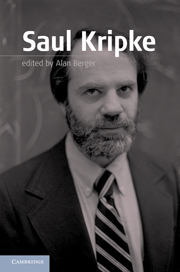Book contents
- Frontmatter
- Contents
- List of Contributors
- Introduction to Kripke
- Part I Naming, Necessity, and Apriority
- Part II Formal Semantics, Truth, Philosophy of Mathematics, and Philosophy of Logic
- Part III Language and Mind
- Part IV Philosophy of Mind and Philosophical Psychology
- 13 Kripke and Cartesianism
- 14 Not Even Computing Machines Can Follow Rules
- Index
- References
13 - Kripke and Cartesianism
Published online by Cambridge University Press: 05 June 2012
- Frontmatter
- Contents
- List of Contributors
- Introduction to Kripke
- Part I Naming, Necessity, and Apriority
- Part II Formal Semantics, Truth, Philosophy of Mathematics, and Philosophy of Logic
- Part III Language and Mind
- Part IV Philosophy of Mind and Philosophical Psychology
- 13 Kripke and Cartesianism
- 14 Not Even Computing Machines Can Follow Rules
- Index
- References
Summary
The metaphysical and semantical ideas Saul Kripke advanced in the early 1970s, in Naming and Necessity and “Identity and Necessity,” have found wide acceptance among philosophers. But what is perhaps the most intriguing application he made of these ideas was in his discussion of the mind/body problem, where his arguments and conclusions are widely regarded as Cartesian in spirit; and here many fewer have been convinced. Those who accept the central ideas of his philosophy, but also accept materialist or physicalist views of the sort Kripke uses these ideas to attack, face the challenge of showing that these are not, as he forcefully argued, incompatible.
- Type
- Chapter
- Information
- Saul Kripke , pp. 327 - 342Publisher: Cambridge University PressPrint publication year: 2011
References
- 1
- Cited by



